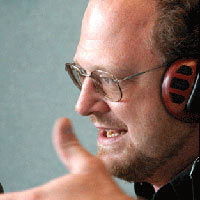What that means is if one can't catch a cab at a stand, or flag one down on the street, one has to wait at a bar or some other locale for a ride -- not exactly what some want when a drunk is retching about or making uncomfortable advances on a drinking night.
The City of Madison has seen the light and started taxi stand service on University Avenue.
"Well-placed and frequently serviced taxi stands have been shown to reduce concentrations of intoxicated patrons and improve patron safety by reducing the opportunity for crime," says Madison Mayor David Cieslewicz.
Well put. Recently, Seattle developed several late-night taxi stands near its entertainment district through the "Last Call" Public Health Department initiative. Madison's plan is a public-private partnership between the city and its three cab companies. The stands will operate from midnight to 3 a.m.
Not only does Milwaukee need more taxi stands, in a truly big city, one can flag down rides, too.
Hard at Work Until the End: City of Milwaukee taxpayers should be rest assured that their elected officials were hard at work right up to the end of their terms. The Common Council scheduled the last meeting of its term on Wednesday -- a mere five days before the council switches hands. The big inaugural party takes place April 15.
It's an opportunity for the council to finish some work before facing the uncertainty of what the two new members of the council would do. One item is Police Chief Ed Flynn's desire to reorganize the department's command structure, which was sent back to him for further review late last month and was scheduled for a special hearing Wednesday morning.
Given the coughs echoing around the chambers at Wednesday's meeting, it's a good thing the body is adjourned.
A Smoking Ban Grenade: Here's the latest grenade tossed into the smoking ban debate -- smoking bans might inadvertently cause increased amounts of driving accidents. Two state researchers published a study in the Journal of Public Economics suggesting that smokers will drive longer distances to drink in taverns that allow smoking, thus making them statistically more likely to get into an accident.
Chad Cotti, one the co-researchers, suggested that non-smokers driving further to find a non-smoking place to hang could face the same risk.
"At first it was quite startling," Cotti told the press of the findings.
This didn't sit well with two silk stocking Milwaukee law firms -- Foley and Lardner and Michael, Best and Friedrich -- who correctly realized their billable hours were at stake. Most assessment appeals here are made by corporations looking for a tax break. Some recent notable appeals by Bank One and Walgreen's cost the city over $1 million.
Foley attorney Maureen McGinnity told a Common Council committee recently that changing the process would force those wanting to appeal into "giving up their equal protection." She said there's more value in a judge hearing oral arguments in a courtroom than reading transcripts of prior hearings.
Michael, Best and Friedrich attorney Robert Gordon complained that the state passed the bill in a "stealth manner" and that the council should wait a year before implementing the new rules.
Aldermen on the committee noted that most appeals were made by corporations, "not Jane and Joe lunch box" and that the measure was one the city had been asking to have for five years, repudiating any argument of stealth activity. The city Assessor's office said the new rules -- which the Council needs to adopt -- would save the city money.
Banning Elections: In light of the distaste left in most mouths after the recent Supreme Court election, state Rep. Fred Kessler is suggesting that the governor appoint justices, who serve 10-year terms. That's something unlikely to pass the divided Legislature or even pass the fickle public's ballot senses, whom we're sure actually like voting for the Supreme Court justices. The public is probably more inclined to have the Legislature clean up a campaign system that allows special interests to lob bombs at campaigns with impunity.
Bad Finance Actors: Speaking of bad actors in the world of campaign finance, All Children Matter, a leading special interest group that regular funnels large amounts of cash to Milwaukee School Board candidates who support the voucher system, was fined a record amount for its questionable activities. The group is also known to work with the Milwaukee-based School Choice Wisconsin.
The Michigan-based school voucher advocacy group was slapped this week with a record $5.2 million fine for campaign finance violations in Ohio. All Children Matter --founded by Dick DeVos, a former Amway exec and 2006 GOP candidate for governor in Michigan, and now headed by his wife -- used a Virginia affiliate to funnel $870,000 to a political action committee in Ohio.
The $5.2 million penalty is a record fine for a campaign finance violation in Ohio and may be a record in the nation.
Parking Prices Higher: Getting a handle on the greater Downtown parking situation will cost more than aldermen thought. Ald. Bob Bauman wants a study done to determine the needs for parking in terms of the Downtown Plan.
The city was willing to pay $30,000 for the study, but there were no takers. Bauman wants the ante upped to $50,000. The study would encompass an area stretching from as far north as Walnut Street to as far south as Greenfield Avenue as far west as I-43 and 6th Street and the lake on the east.
An avid outdoors person he regularly takes extended paddling trips in the wilderness, preferring the hinterlands of northern Canada and Alaska. After a bet with a bunch of sailors, he paddled across Lake Michigan in a canoe.
He lives in Bay View.




